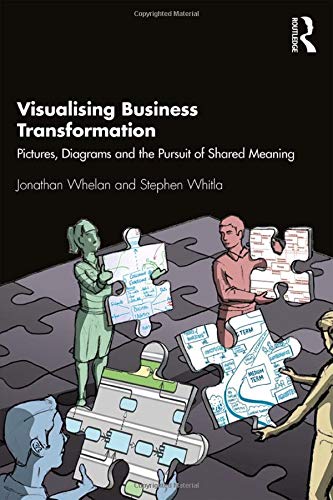Download Visualising Business Transformation: Pictures, Diagrams and the Pursuit of Shared Meaning PDF Free - Full Version
Download Visualising Business Transformation: Pictures, Diagrams and the Pursuit of Shared Meaning by Jonathan Whelan, Stephen Whitla in PDF format completely FREE. No registration required, no payment needed. Get instant access to this valuable resource on PDFdrive.to!
About Visualising Business Transformation: Pictures, Diagrams and the Pursuit of Shared Meaning
Business transformation typically involves a wide range of visualisation techniques, from the templates and diagrams used by managers to make better strategic choices, to the experience maps used by designers to understand customer needs, the technical models used by architects to propose possible solutions, and the pictorial representations used by change managers to engage stakeholder groups in dialogue. Up until now these approaches have always been dealt with in isolation, in the literature as well as in practice. This is surprising, because although they can look very different, and tend to be produced by distinct groups of people, they are all modelling different aspects of the same thing. Visualising Business Transformation draws them together for the first time into a coherent whole, so that readers from any background can expand their repertoire and understand the context and rationale for each technique across the transformation lifecycle. The book will appeal to a broad spectrum of readers involved in change, whether that is by creating change models themselves (strategists, architects, designers, engineers, business analysts, developers, illustrators, graphic facilitators etc.), interpreting and using them (sponsors, business change managers, portfolio / programme / project managers, communicators, change champions etc.), or supporting those involved in change indirectly (trainers, coaches, mentors, higher education establishments and professional training facilities).
Detailed Information
| Author: | Jonathan Whelan, Stephen Whitla |
|---|---|
| Publication Year: | 2020 |
| ISBN: | 1032337117 |
| Pages: | 215 |
| Language: | other |
| File Size: | 11.8672 |
| Format: | |
| Price: | FREE |
Safe & Secure Download - No registration required
Why Choose PDFdrive for Your Free Visualising Business Transformation: Pictures, Diagrams and the Pursuit of Shared Meaning Download?
- 100% Free: No hidden fees or subscriptions required for one book every day.
- No Registration: Immediate access is available without creating accounts for one book every day.
- Safe and Secure: Clean downloads without malware or viruses
- Multiple Formats: PDF, MOBI, Mpub,... optimized for all devices
- Educational Resource: Supporting knowledge sharing and learning
Frequently Asked Questions
Is it really free to download Visualising Business Transformation: Pictures, Diagrams and the Pursuit of Shared Meaning PDF?
Yes, on https://PDFdrive.to you can download Visualising Business Transformation: Pictures, Diagrams and the Pursuit of Shared Meaning by Jonathan Whelan, Stephen Whitla completely free. We don't require any payment, subscription, or registration to access this PDF file. For 3 books every day.
How can I read Visualising Business Transformation: Pictures, Diagrams and the Pursuit of Shared Meaning on my mobile device?
After downloading Visualising Business Transformation: Pictures, Diagrams and the Pursuit of Shared Meaning PDF, you can open it with any PDF reader app on your phone or tablet. We recommend using Adobe Acrobat Reader, Apple Books, or Google Play Books for the best reading experience.
Is this the full version of Visualising Business Transformation: Pictures, Diagrams and the Pursuit of Shared Meaning?
Yes, this is the complete PDF version of Visualising Business Transformation: Pictures, Diagrams and the Pursuit of Shared Meaning by Jonathan Whelan, Stephen Whitla. You will be able to read the entire content as in the printed version without missing any pages.
Is it legal to download Visualising Business Transformation: Pictures, Diagrams and the Pursuit of Shared Meaning PDF for free?
https://PDFdrive.to provides links to free educational resources available online. We do not store any files on our servers. Please be aware of copyright laws in your country before downloading.
The materials shared are intended for research, educational, and personal use in accordance with fair use principles.

